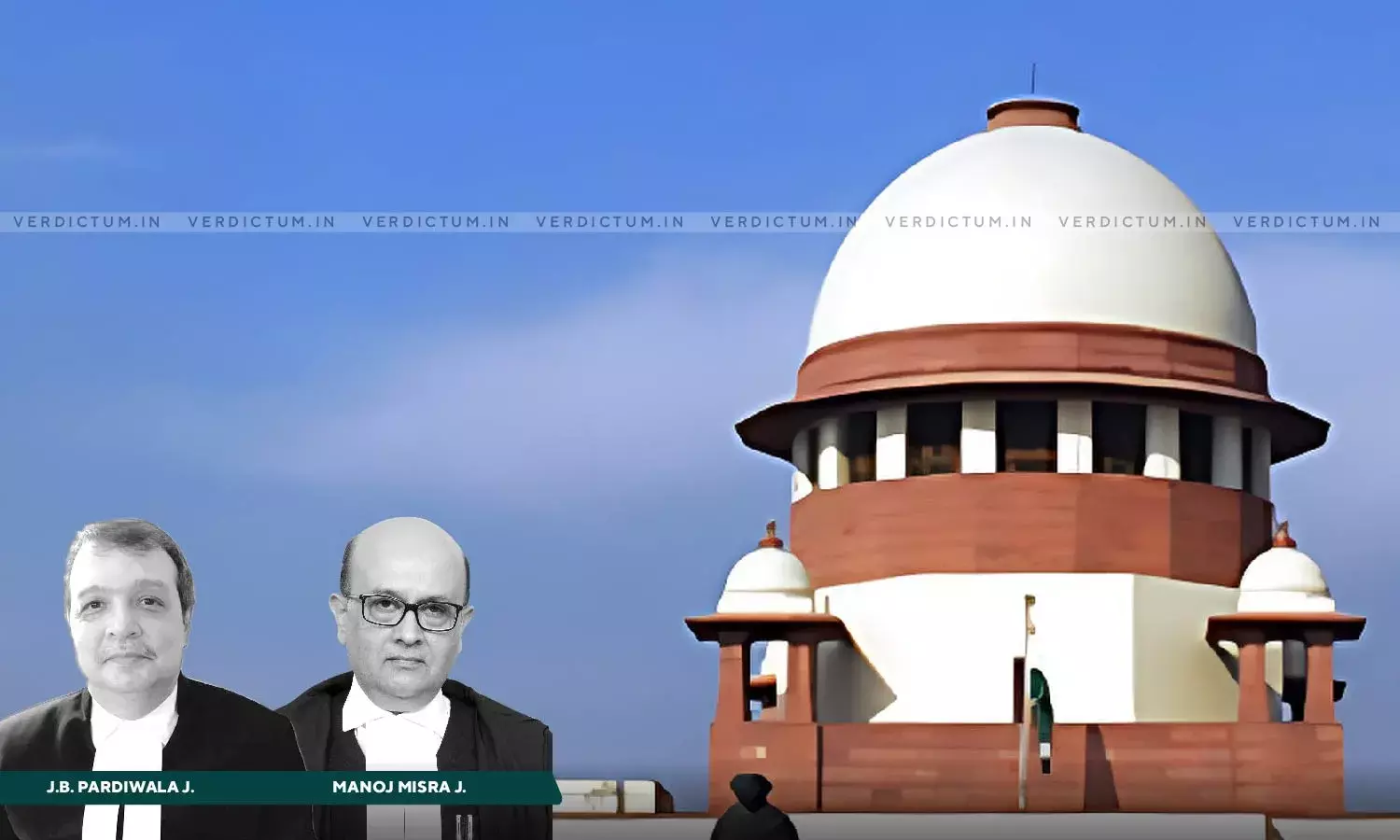S. 106 Evidence Act Can’t Be Invoked To Make Up Inability Of Prosecution To Produce Evidence Of Circumstances: Supreme Court
The Supreme Court emphasised that the Court should apply Section 106 of the IEA in criminal cases with care and caution.

The Supreme Court in its recent Judgment, held that Section 106 of the Indian Evidence Act, 1872 (IEA) cannot be invoked to make up the inability of the prosecution to produce evidence of circumstances pointing to the guilt of the accused.
The Court held thus in a Criminal Appeal of the Madhya Pradesh State against the High Court’s Judgment by which it allowed an Appeal of the accused and acquitted him of the offence under Sections 302, 201, and 34 of the Indian Penal Code, 1860 (IPC).
The two-Judge Bench comprising Justice J.B. Pardiwala and Justice Manoj Misra observed, “Section 106 cannot be invoked to make up the inability of the prosecution to produce evidence of circumstances pointing to the guilt of the accused. This section cannot be used to support a conviction unless the prosecution has discharged the onus by proving all the elements necessary to establish the offence. It does not absolve the prosecution from the duty of proving that a crime was committed even though it is a matter specifically within the knowledge of the accused and it does not throw the burden on the accused to show that no crime was committed.”
The Bench added that to infer the guilt of the accused from absence of reasonable explanation in a case where the other circumstances are not by themselves enough to call for his explanation is to relieve the prosecution of its legitimate burden and so, until a prima facie case is established by such evidence, the onus does not shift to the accused.
AOR Pashupathi Nath Razdan appeared on behalf of the Appellant/State while AOR Anil Shrivastav appeared on behalf of the Respondent/Accused.
In this case, a woman was allegedly murdered by her husband in 2003. The prosecution's case relied on the testimony of the victim's minor daughter, who witnessed the crime. The Trial Court convicted the husband under Sections 302, 201 read with 34 of the IPC. However, the High Court acquitted him. Hence, the State approached the Supreme Court, challenging the High Court's decision.
Reasoning
The Supreme Court in view of the facts and circumstances of the case, noted, “Section 106 obviously refers to cases where the guilt of the accused is established on the evidence produced by the prosecution unless the accused is able to prove some other facts especially within his knowledge which would render the evidence of the prosecution nugatory. If in such a situation, the accused offers an explanation which may be reasonably true in the proved circumstances, the accused gets the benefit of reasonable doubt though he may not be able to prove beyond reasonable doubt the truth of the explanation. But if the accused in such a case does not give any explanation at all or gives a false or unacceptable explanation, this by itself is a circumstance which may well turn the scale against him.”
The Court said that the appreciation of testimony of a witness is a hard task and there is no fixed or straight jacket formula for appreciation of the ocular evidence. It further emphasised that the Court should apply Section 106 of the IEA in criminal cases with care and caution.
“Section 106 of the Evidence Act would apply to cases where the prosecution could be said to have succeeded in proving facts from which a reasonable inference can be drawn regarding guilt of the accused”, it enunciated.
The Court observed that the presumption of fact is an inference as to the existence of one fact from the existence of some other facts, unless the truth of such inference is disproved.
“Cases are frequently coming before the Courts where the husbands, due to strained marital relations and doubt as regards the character, have gone to the extent of killing the wife. These crimes are generally committed in complete secrecy inside the house and it becomes very difficult for the prosecution to lead evidence. No member of the family like in the case on board, even if he is a witness of the crime, would come forward to depose against another family member”, it also remarked.
Moreover, the Court said that if an offence takes place inside the four walls of a house and in such circumstances where the accused has all the opportunity to plan and commit the offence at the time and in the circumstances of its choice, it will be extremely difficult for the prosecution to lead direct evidence to establish the guilt of the accused and it is to resolve such a situation that Section 106 of IEA exists in the statute book.
“We are of the view that the aforementioned circumstances constitute more than a prima facie case to enable the prosecution to invoke Section 106 of the Evidence Act and shift the burden on the accused husband to explain what had actually happened on the day & date his wife died”, it concluded.
Accordingly, the Apex Court allowed the Appeal, set aside the High Court’s Judgment, and convicted the accused.
Cause Title- The State of Madhya Pradesh v. Balveer Singh (Neutral Citation: 2025 INSC 261)
Appearance:
Appellant: AOR Pashupathi Nath Razdan, Advocates Sarthak Raizada, Maitreyee Jagat Joshi, Astik Gupta, and Akanksha Tomar.
Respondent: AOR Anil Shrivastav, Advocates Lakhan Singh Chauhan, Hitesh Kumar Sharma, Amit Kumar Chawla, Akhileshwar Jha, Varun Verma, and Sandeep Singh D.


